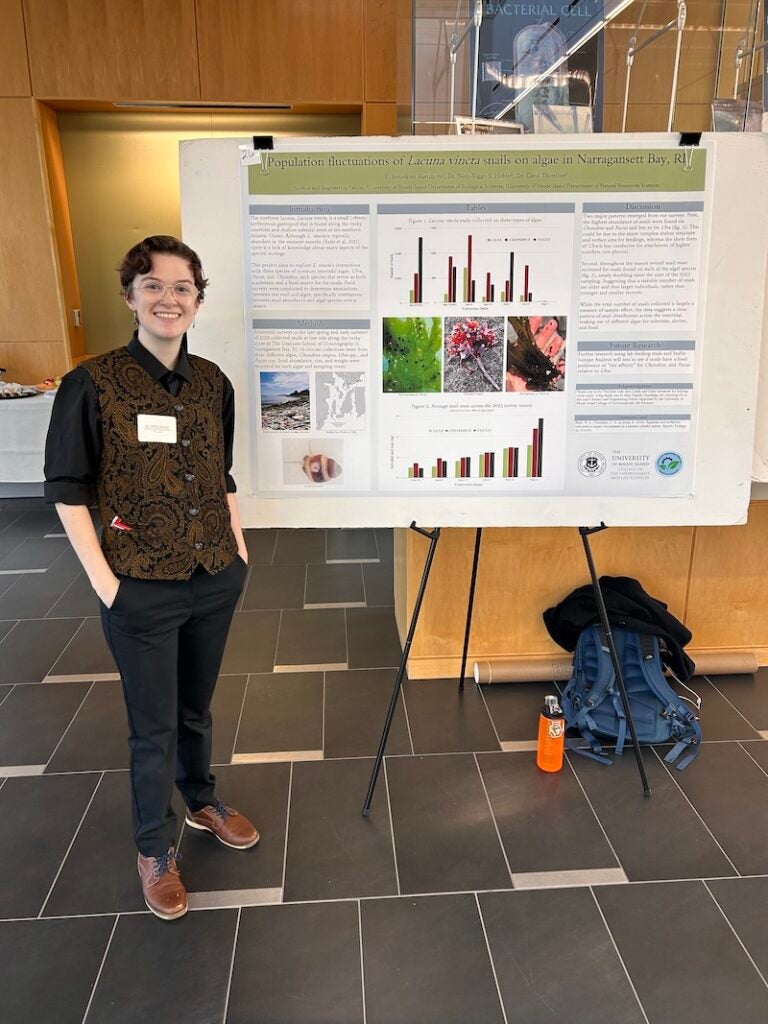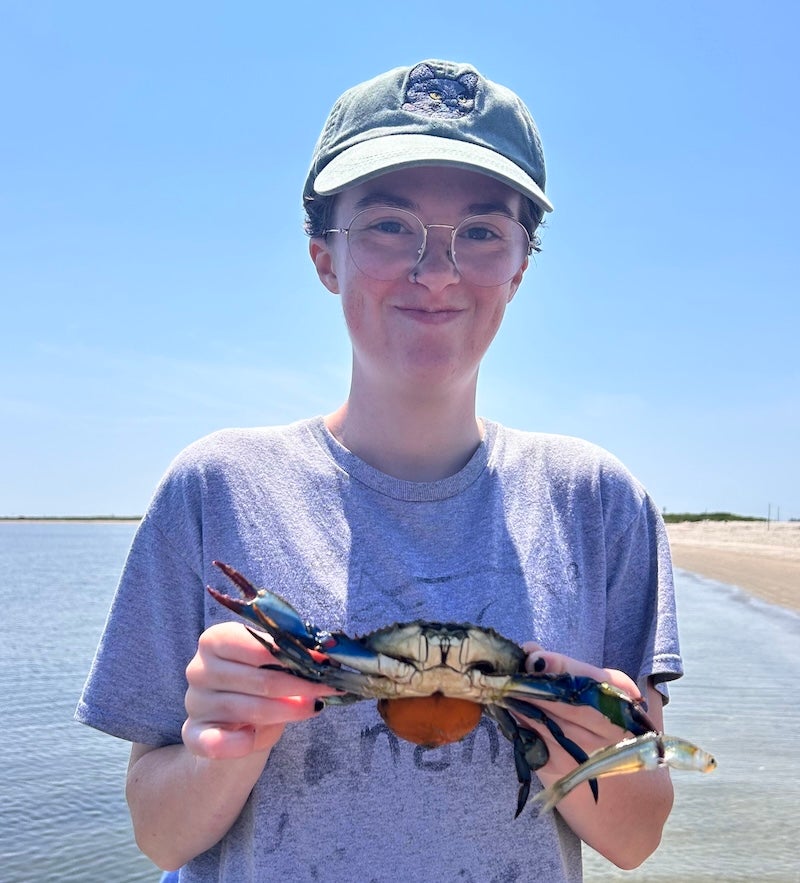At the University of Rhode Island, there is something for everyone and no singular way to make one’s mark: from classes to extracurriculars, students can discover new ways to build community, engage with the world around them, hone talents, and spark positive change. El Fernekees, a senior double majoring in gender and women’s studies (GWS) and marine biology, is a great example of how students are empowered to connect community, scholarship, and activism to enhance their college experiences as they prepare to embark on their academic and professional journeys.
Getting Involved
Fernekees’ unique combination of majors has provided them with an interdisciplinary lens through which to explore the marine sciences. Long interested in how invasive species change marine ecosystems, they began their academic journey majoring in marine biology only. Since high school they have been interested in conservation work and seeking ways to lessen human impacts on other forms of life. But while they were drawn to science, they have also always been aware of how their personal identities and experiences shape the ways they engage with the natural world. “When someone is studying science, they need to understand why they’re doing it and who came before them,” Fernekees says, noting that this belief is what drives them to not only pursue their love of science but to also think critically about the ways that scientists engage with other living things and especially with living communities.
Both in high school and at URI, Fernekees has been dedicated to advocating for and uplifting marginalized voices, such as the LGBTQ+ community, people of color, and disabled communities. As they wanted to navigate science through a more interdisciplinary and intersectional lens, they started taking GWS classes and eventually declared it as a second major. “I’ve taken a lot of classes with Professor Joy Ellison, and they’ve transformed the way I see myself and navigate the world,” Fernekees says. “I implement everything I learn in GWS into how I go through science and work with non-human beings.”
Outside of classes, Fernekees has been involved in many student groups and activities. They were a member of the Gender and Sexuality Alliance, having also served as vice president and then president for the group. They are also involved in URI’s Accessibility Task Force as an undergraduate student representative. Using sea glass and shells from local beaches, they’ve created a variety of artwork and had several of their portraits displayed at two of URI’s student art shows. Even in the midst of their busy schedule, they occasionally find time to also play soccer with the University’s intramural team.
Making Connections
Fernekees is passionate about the power of representation in both academic and professional settings. Because of the barriers they have experienced firsthand in the scientific field, they bring a unique and valuable perspective to research, scholarship, and activism. They note that studying both GWS and marine biology has significantly influenced how they approach science and incorporate diverse perspectives into their work.
“I’ve learned a lot about different communities and how colonialism has shaped our understanding of science,” they say. “We often think about science very narrow-mindedly, and we don’t perceive other living things as living things. I think we as a society need to shift from an individualistic mindset to a more community-based mindset to better understand our struggles and that many of our struggles are often intertwined with each other. When navigating science, I try to implement indigenous perspectives into my work. Here in southern Rhode Island, it’s important to include Narragansett Nation and Niantic perspectives, recognizing that we are on their land and what that means.”
Opportunities Abound
URI faculty are committed to helping students obtain opportunities to explore scholarship and activism. Fernekees notes that Associate Teaching Professor and Marine Biology Program Coordinator Niels-Viggo Hobbs has played a significant role in directing them toward some of the many research opportunities they’ve pursued. They had many opportunities working with Hobbs out in the field, conducting rapid assessment surveys of marine invasive species, and working on lacuna vincta snail studies.
“In GWS, I’ve taken a lot of classes with Professor Joy Ellison, which transformed the way I see myself and navigate the world,” they say. “And Anna Gray is the whole reason I’m a GWS major. I implement everything I learn in GWS into how I approach science. In marine biology, Professor Hobbs was one of the reasons I’ve had all these opportunities. He directed me toward them and has helped me get involved in things like rapid assessment surveys and the Science and Engineering Fellowship. I also want to shout out Assistant Dean for Diversity and Student Success Initiatives Aura Fajardo Grandidge: she has always pushed me to do my best, and has always been in my corner rooting for me. She encouraged me to apply to the two conferences I got accepted into. I appreciate them all deeply.”

Fernekees has worked alongside faculty, presented research at conferences, interned with organizations like RIDEM, and led various mutual aid projects. They have attended two Society for Advancement of Chicanos/Hispanics and Native Americans in Science conferences, getting to present their research on two separate occasions: grant research on Idotea balthica, a small isopod, and presenting work they conducted during their Science and Engineering Fellowship. Fernekees has also worked as a teaching assistant in URI’s marine biology department with Hobbs, and worked alongside Hobbs in Professor Carol Thornber’s lab studying invertebrates. Working with RIDEM’s Division of Marine Fisheries over the summer, they assisted with conservation research on eelgrass and seed preservation.
“Be Original”
Fernekees’ curiosity, determination, and passion for both social justice and marine science has opened up a world of possibilities. Through the guidance and encouragement of faculty and other mentors, they have expanded their horizons and transformed the ways they approach science. Reflecting on their time at URI, Fernekees shares some advice for incoming and current students: don’t take no for an answer, and be original. “People don’t know who you are and what you are capable of. They don’t know your story,” they say. “If you want to do something, you’ll make it happen. And just be yourself. You’ll attract the people you want to be with. Be original and don’t try to conform–just do what you want to do.”
There are many ways to explore your interests, conduct and present your research pursuits, find community, and discover your place in the world at URI. From the flexibility and variety of majors, assortment of student groups and recreational activities, opportunities for paid research and work in your field of interest, and supportive faculty who are eager to help, students are able to thrive in their academic, professional, and social lives. Whether you have your academic career path already figured out, or you’re unsure about what course of study is right for you, there’s plenty of room to explore the world around you, engage in what drives you, and discover yourself.
~ Written by Yvonne Wingard, CELS Communications Fellow

